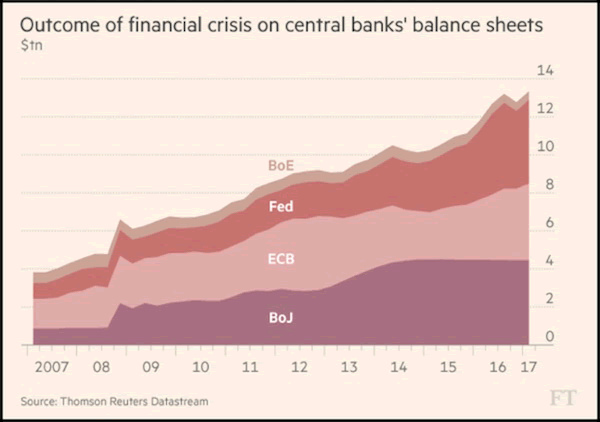A Financial Crisis Of Historic Proportions Is Once Again Bearing Down On Us
Stock-Markets / Financial Crisis 2017 Jul 13, 2017 - 03:34 PM GMTBy: John_Mauldin
 Financial politicians (aka central bankers) have a long history of saying the wrong things at the wrong time.
Financial politicians (aka central bankers) have a long history of saying the wrong things at the wrong time.
Far worse, they simply fail to tell the truth. They lie because they’re afraid of the impact the truth will have. This is a problem, because markets can’t function on false information, at least not forever.
They also face enormous pressure to “do something,” even when the right thing is to do nothing and just let the market clear.
Janet Yellen’s recent reassurance regarding the likelihood of another financial crisis was likely one of those lies. Here is the full quote.
Would I say there will never, ever be another financial crisis? You know probably that would be going too far, but I do think we’re much safer, and I hope that it will not be in our lifetimes and I don’t believe it will be. [emphasis added]
I disagree with almost every word in those two sentences, but my belief is less important than Chair Yellen’s. If she really believes this, then she is oblivious to major instabilities that still riddle the financial system.
That’s very worrisome.
Central Bankers Have Hit a Brick Walk That They Have Built Themselves
The present challenge arose because our central bank monetary heroes allowed QE, ZIRP, and in some places NIRP to go on far longer than was wise
These measures may have been necessary in 2008 and for a short period afterward. But these policies should not have stayed in place, much less been expanded, for 7–9 more years.
Yet they were.
At least, our central bankers are talking about the problem. Their new buzzword is policy normalization. Everyone (except the Bank of Japan) agrees that abnormality has outlived its usefulness.
However, solutions are difficult when that first timid step runs you smack into a brick wall that you yourself built because you waited too long to act.
The Fed, the ECB, and the Bank of England have waited four years too long. Now they are finally tightening in a strange combination of caution and boldness. Each passing month makes them less cautious and more aggressive.
Like kittens, they venture out from their mother gingerly at first but soon are romping underfoot and destroying furniture.
That may be an amusing analogy, but reality is not amusing at all. The four largest central banks together have about $13 trillion on their balance sheets (see the chart below), a large portion of which they believe needs to roll off.

Removing it without breaking something important will not be easy.
Implications Are Dire and Global
The parlous state of the economy is not just an American problem, or a European or UK or Japanese or Chinese one. It is global.
I wonder whether Janet Yellen truly appreciates the degree to which Federal Reserve policy affects the entire world. Like it or not, the US dollar is the entire planet’s ultimate medium of exchange.
One way or another, almost every financial transaction eventually settles in dollars. China and others would like to change that. Maybe they’ll succeed someday, but it won’t be this year or next.
That being the case, the way Fed policy impacts the dollar could make the inevitable crisis much worse. Looking only at the US, there’s a strong case for raising—oops, I mean “normalizing”—rates.
Going to even 2% or 3% won’t kill our economy. But hiking rates will likely create other victims whose problems will soon become our problems, too.
Think of all the dollar-denominated debt owed by various emerging-market governments and businesses. Higher US rates will strengthen the dollar and make that debt costlier to service, almost certainly causing some defaults.
In today’s highly leveraged markets, the pain caused by those defaults will quickly spread to lenders in Europe, Japan, and the US.
You might respond that more stringent capital requirements mean today’s banks are better able to withstand such scenarios. That’s partly true. Yes, they pass the Fed’s stress tests, but the Fed can’t test every possible adverse scenario. Generals always fight the last war. The next crisis probably won’t originate in residential mortgage loans. It will come from somewhere else, and we have no idea whether the banks are actually ready for it.
You and I can’t control whether banks are ready, but we can control whether we are ready. I’m convinced myself beyond any doubt that a crisis of historic proportions is once again bearing down on us. We may have little time to prepare.
We definitely have no time to waste.
Join hundreds of thousands of other readers of Thoughts from the Frontline
Sharp macroeconomic analysis, big market calls, and shrewd predictions are all in a week’s work for visionary thinker and acclaimed financial expert John Mauldin. Since 2001, investors have turned to his Thoughts from the Frontline to be informed about what’s really going on in the economy. Join hundreds of thousands of readers, and get it free in your inbox every week.
John Mauldin Archive |
© 2005-2022 http://www.MarketOracle.co.uk - The Market Oracle is a FREE Daily Financial Markets Analysis & Forecasting online publication.



